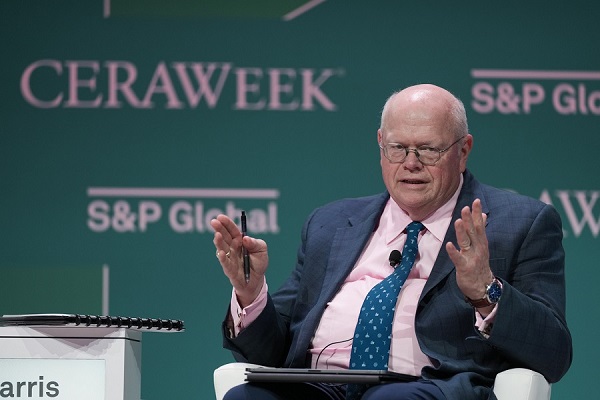
Britt Harris, Utimco CEO and an advisor to the New York Federal Reserve, addressed the “utopian” energy transition, said the Fed rate will probably go to 5% in March and said war with China could break out within the next 10 years. (Source: Shutterstock.com)
The U.N. climate plan is “completely wrong” and “utopian,” according to the president and CEO of the nearly $70-billion University of Texas/Texas A&M Investment Management Co. (Utimco), manager of the largest U.S. public endowment fund.
“We're in the early stages and we're going in the wrong direction,” Britt Harris said at CERAWeek by S&P Global in a roundtable discussion on energy markets.
Session moderator James Burkhard, an S&P Global vice president, posed the question, “Where are we in the energy transition?” Harris said the U.N. plan “right now is not working. It's not going to work. It's utopian.
“It's created by activists and environmentalists, who think you can just change like that with no impact on people. Of course, that's completely wrong.”

Among problems he cited, it's too expensive: $275 trillion. “And finally, it's not compassionate.”
Some 10% of the world doesn’t have electricity and some 75% doesn’t have reliable electricity, he said.
The International Energy Agency (IEA) reported in November that 775 million people don’t have electricity or about 10% of the world’s estimated current population of 7.9 billion. IEA projects 660 million people won’t have access to electricity in 2030, with 85% of those in sub-Saharan Africa. The U.N.’s goal is universal access by 2030.
“And we're going to force [people] off of the things that can get them there,” Harris noted of the U.N. plan. “If we didn't think hydrocarbons could get you off poverty, then why did we give China 10 extra years to use hydrocarbons?
“It doesn't make sense. We have to take more consideration of the poor.”
Harris, who serves as a member of the President’s Working Group for Financial Markets and as an advisor to the New York Federal Reserve, also outlined the possibility of conflict with China and the likelihood of further interest rate increases.
War with China?
On relations with China, the subject of a recent congressional hearing, Harris said that the country’s strategy has evolved from economic “collaboration and cooperation” to the next phase of its 100-year plan: competition.
Right now, “they're on a competitive basis and we're still operating on a collaborative basis,” he said.
He added that “we're probably going to be at war with China sometime over the next 10 years. Obviously, we're going to try to avoid that, but it's probably the highest scenario.”
China is 40% of the world market for stocks and bonds. “They're coming out of a very weak economic and financial-market history” of a 1% rate of return for the past decade and may have “made a major blunder in how they handled COVID.”
Nonetheless, “it's the first time that America has had a rival our size. And right now, everything is negative.”
Investing in hydrocarbons
Echoing comments made on March 7 by Hess Corp. CEO John Hess, Harris also suggested that the lack of investment in oil and gas remains problematic.
About a year ago, many of the largest private-equity sources resolved to no longer invest in oil and gas exploration. “And that was not because they'd done some kind of study that said it was not ideal to do it.”
Instead, many large funds that invest in private equity firms’ fund-raisers—“a lot of them in Europe and in California—basically held them hostage and said, ‘If you do not put this clause into your new fund, then we won’t commit.’”
For a private equity firm wanting to raise a $20-billion fund, “you have to have several $500-million commitments.” The choice was to not hit the fund-raise target “or capitulating to this new factor.”
It was a win, though, for fund managers like Utimco that continued to invest in oil and gas. “As soon as [the others withdrew], hydrocarbon [prices] soar and everything else plunges. So I think that [position] has weakened a little bit.”
Federal funds rate
Harris also addressed interest rates, which he said are likely to rise.
“The Fed is still committed to getting the inflation rate down to 2%,” he said. “The advisers are skeptical that they're going to be able to achieve that without hurting growth too much.”
But, “they’re going for [a federal funds rate of] 500 basis points, minimum, unless something blows up. They've gotten to 475; we'll go to five this [month] probably or more.”
The direction that inflation was heading while coming out of COVID needs to avoid the direction the U.S. was heading in the 1960s, which led to mortgage rates of more than 30% by the early 1980s, he said.
“We just have to make sure we don't make the same mistakes that we made then.”
He expects a new floor at 3%. “Then, you'll have the markets sort of gather around that,” he said.
Recommended Reading
Oil Prices Fall as Investors Take Stock of Biden Exit, Rate Cuts in Focus
2024-07-22 - Oil prices fell on July 22 after Joe Biden announced he would not seek a second term as U.S. president.
What's Affecting Oil Prices This Week? (June 10, 2024)
2024-06-10 - Stratas Advisors says the latest EIA report illustrates that U.S. production growth has stagnated with U.S. oil production remaining at 13.1 MMbbl/d, which is unchanged from the previous 12 weeks.
Oil Settles Slightly Up on Forecasts for Strong Global Demand
2024-06-11 - Oil prices edged up to settle slightly higher on June 11 as the U.S. Energy Information Administration raised its global oil demand growth forecast for the year, while OPEC stuck to its forecast for relatively strong growth in 2024.
Paisie: OPEC+ Will Be Able to Manage Prices
2024-07-11 - Disappointing economic news has contributed to a drop in oil prices.
Oil Prices Up Slightly as US Crude Oil Inventories Fall
2024-07-03 - The U.S. Energy Information Administration reported a 12.2 million draw in the country's crude oil barrels in storage last week.



